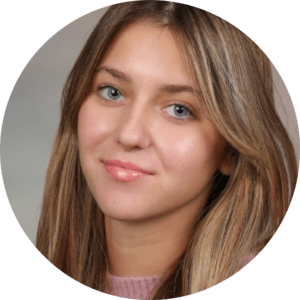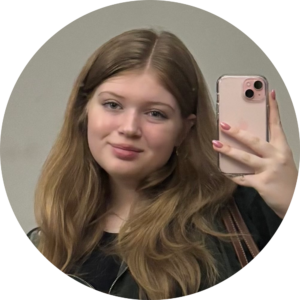17-year-old Klaudia Bacza visits a bombed school in Lviv and interviews the vice principal

Klaudia Bacza (right) with Lyudmila Sakovich at Lyceum Oriana, Lviv, July 2024.
Picture by: OXSFJ
Article link copied.
April 18, 2025
‘I’m with my students till the end’: A Ukrainian teacher’s fight to survive a school bombing
As Ukraine enters a third year of its war with Russia, world leaders are still in heated negotiations about a possible ceasefire and even an end to the war. Until then, the resilience of the Ukrainian people remains unwavering.
The future of Ukraine is being fought not only on the frontlines but in classrooms, hospitals and homes. Soldiers, doctors, firefighters and teachers are at the heart of this fight, protecting the nation and supporting the next generations.
During my visit to Ukraine in the summer of 2024, I met one of the most courageous people I know: Lyudmila Sakovich, the vice principal of Lyceum Oriana in Lviv. Lucy, as she likes to be called, has worked in education for 14 years – eight of them at this school – teaching Ukrainian, Polish and literature.
Harbingers’ Weekly Brief
Six months earlier in December 2023, there was a devastating bombingat the school. The bombing left one person injured and the school destroyed, but nonetheless Lucy remains dedicated to stabilising the children’s mental health while working to rebuild the school facilities. Two years later in 2025, the school is still undergoing construction.
In July 2024, the journey to the school led us through a peaceful neighborhood. The kids were running and laughing on the grass, the sun shining down as if nothing had happened. But just months ago, this very place had been bombed, leaving the walls broken and the classrooms in ruins.
Stepping inside, the contrast was jarring. Where laughter once echoed, only the quiet weight of destruction was left. Cracked walls and shattered windows showed the aftermath of the Russian missile attack.
Walking through the halls of the halls, it was alarming to step foot in a place that had endured such tragedy while being the target of the Russian military. I couldn’t imagine what it must be like for the kids who have to go there every day while trying to feel safe and continuing with their studies.
Lucy shared her story: “I wanted to be a teacher from a very young age, because my mom and my granny and my aunts were teachers. They inspired me.” As she took me on a tour of the school, the faded-out drawings and the artwork made by children stood out.
While showing the classrooms, Lucy explained the significant reduction in resources. She pointed to the crayons and paper: “These are the most important supplies. We don’t need more; we can’t have more.”
The reason, she explained, is that during alarms students are sometimes forced to leave their belongings behind and seek shelter. As a result, teachers have adapted by minimising physical objects in the classroom, focusing primarily on paper. This approach also proves to be more practical when computers or the internet are unavailable, making it easier to continue lessons without the need for additional resources.
Lucy has become an inspiration to many teachers in Ukraine as she continues to fight. “I’m not only giving knowledge, I’m giving my heart. And I’m helping them to grow as human beings.”
Lucy has become an inspiration to many teachers in Ukraine as she continues to fight. “I’m not only giving knowledge, I’m giving my heart. And I’m helping them to grow as human beings.”
She shared how difficult it has been for some of the kids to adjust and work through the constant fear of bombings. Around 1.5 million children in Ukraine are currently at risk of long-term mental health consequences from the war, according to UNHCR.

The school’s bomb shelter.
Picture by: OXSFJ
‘We are building a better future’
The harsh reality of the school bomb shelters became evident when I saw them – cold, gray underground rooms equipped only with stools and chairs.
Despite her best efforts to create a more comforting environment with colourful walls and games, Lucy acknowledged the grim truth: children sometimes spend days in these shelters.
Reflecting on one such experience, Lucy recalled the fear and uncertainty they endured while locked inside with 80 students, cut off from the outside world.
“Even in the darkest times, we have the power to bring light, to help others shine, to show them the way,” she said. “I tell my kids – I’m here, I’m with you. I don’t know if I can help you or not, but I’m here with you till the end.”
Lucy reminds her students that the world can be tough, but they are tougher. “We are building a better future, one student at a time.”
Alongside rebuilding the school, Lucy organises trips to camps across Europe to give children a chance to feel safe and reconnect with the rest of the world. “We are going to these camps to show them that the world is beautiful and it’s not always about war. Nature is beautiful. And we have to live in harmony in this world.”
Written by:

Writer
Krakow, Poland
Born in 2007 in Krakow, Poland, Klaudia now studies in London, England where she is interested in history, English, French, and art design. In the future, she plans to study law in the United States.
In her free time, Klaudia plays tennis and basketball and enjoys painting, travelling, and running.
She speaks Polish, Ukrainian, Russian, English, and is learning French.
Edited by:

🌍 Join the World's Youngest Newsroom—Create a Free Account
Sign up to save your favourite articles, get personalised recommendations, and stay informed about stories that Gen Z worldwide actually care about. Plus, subscribe to our newsletter for the latest stories delivered straight to your inbox. 📲
© 2025 The Oxford School for the Future of Journalism




